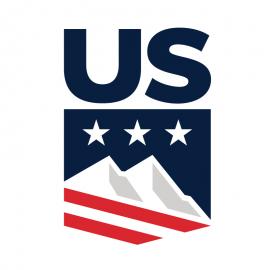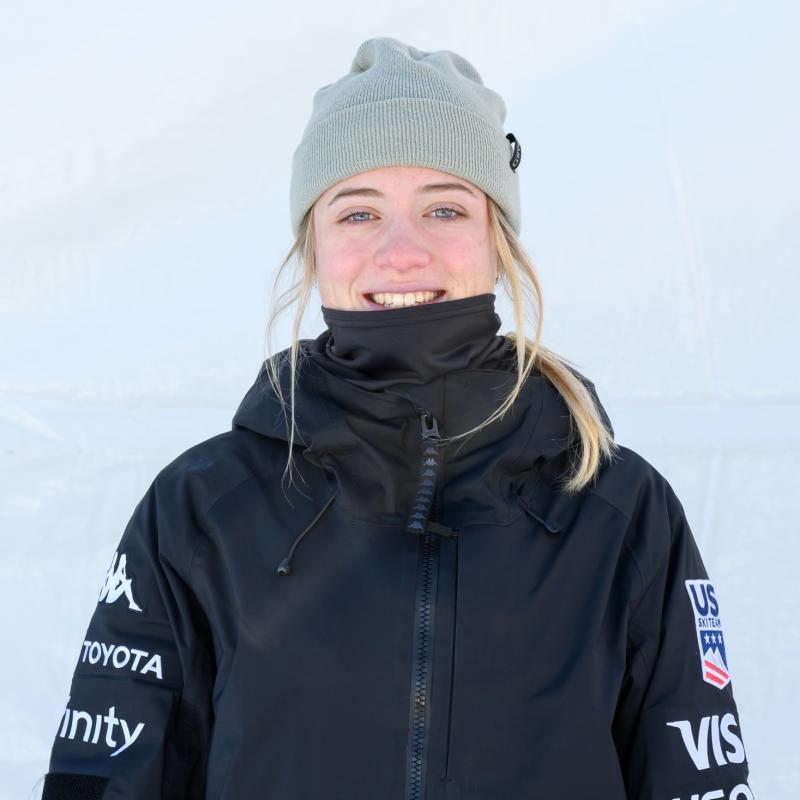Giaccio Back on Snow

Olivia Giaccio was on track to have a breakout season in 2019-2020 when she tore her left ACL during official training for the Thaiwoo Dual Moguls World Cup last December. She had made history the season before as the first woman to throw a cork 1080 in FIS Moguls World Cup competition and had been training the highest degree of difficulty run for women. That day in December was the last of a six-week long trip, so although Olivia returned home with her team, she would not return to competition in 2020.
On January 2, Olivia underwent surgery at the Steadman Clinic in Vali, Colo., with Dr. Hackett, and has since been dedicated to her rehab process. Not knowing what 2020 had in store for the world, Olivia planned to be back on snow in September. However, due to travel restrictions brought on by COVID-19, it wasn’t until November that Olivia finally put skis to snow.
“One thing I knew that would be super important, and proved to be so, has been to take it day by day,” Olivia said. “That lesson really helped out during COVID with so much unknown. You can only control what’s going on right in the present. That aspect of knowing what I could control was important for me early on.”
Going from skiing at the highest competitive level to crutches was not an easy pill to swallow.
“The first six weeks were probably what felt like the longest six weeks of my life. I had never been on crutches before. One thing I found super annoying was having to ask people for help. I couldn’t even carry my lunch from the buffet to the table [at the COE]. It was infuriating. Two weeks prior I was skiing on a mountain doing big tricks and going fast through moguls, and here I was [unable to carry my lunch]. It left me feeling very helpless. But that was another lesson: there’s a lot to be learned in asking for help.”
By the time Olivia was off crutches, the moguls team had departed overseas to finish out the competitive season. Her recovery progressed well through February and March. Even off crutches she was still restricted in some of her movements due to the nature of her injury. “Even though it’s a slow process, once off crutches, to see that slow bit of improvement every single day kept me motivated throughout those early stages.”
When COVID-19 forced worldwide lockdowns, Olivia had to shift her workouts and physical therapy home. She felt lucky in the timing, “I didn’t necessarily need manual therapy [during April and part of May]. I was more focused on strengthening everything, getting my movement back, and building myself back up.”
Her focus throughout the summer was relearning motor patterns, strengthening and getting her power back. She passed her water ramp testing in September and was able to get 17 days in at Utah Olympic Park - an unexpected silver lining from moguls’ training schedule changes due to COVID-19.
Besides training to be back as one of the world’s top mogul skiers, Olivia took advantage of the new normal of online schooling. As student-athlete undergraduate at Columbia University, Olivia knew she would be chipping away slowly at her degree. However, with the time and new online offerings, Olivia took a full course load this fall semester and plans to do the same in the spring if everything is still virtual. By the end of next summer she will be roughly done with her sophomore year of college.
Olivia reflected that her time away from competition and training enabled her to build a stronger mental fortitude.
“I had to figure out that helpless feeling. I had to figure out who I was without being a mogul skier. I started competing when I was nine, and I haven’t not competed for this long since. Mentally, it was nice to be able to take a step back, figure out why I was doing what I was doing, and what I need when I come back. It all sounds cliche, but I feel a new perspective on sport and performance and what I want out of mogul skiing, what I want out of myself as a performer and competitor.”
Coming back from injury proved to be a lesson in flexibility. “Yes, there is importance in setting goals, but there’s also importance in understanding how to be flexible, knowing my expectations aren't always going to be reality, and figuring out how I can respond to that.”
Olivia remembered her last steps in getting back to water ramping, “I was short of the benchmark by just 1% in one part of meeting criteria to ramp at one point. Testing proved how hard I had been working, but showed how much farther I needed to go. It was an interesting place to be, very challenging.”
Once back on the water Olivia “felt like an athlete again.” Going off of the ramps in her first straight airs she was ecstatic. “I generally strongly dislike straight jumps. But my first times down the ramp into the water I just had this huge smile on my face. I was so excited to be back. And even when I was frustrated with myself in training, it was an exciting kind of frustration. Because working through a challenge on the ramps or on snow is so much more fun than trying to make my knee bend in the PT room with tears streaming down my face.”
Olivia’s return to snow came on Nov. 7 with the team’s return to snow in Ruka, Finland, during their first on-snow camp since Timberline in July. The team was able to get two ski sessions in over four days before they made the long drive to Idre Fjäll, Sweden, which has a full mogul course open. “It was awesome. Everything went super smoothly. I had a ton of fun, I’m still having a ton of fun.”
She reflected, though, that the moment her clicking into ski boots meant she was where she needed to be came earlier in the summer. “When I clicked into my skis to water ramp, before I clicked into my left ski, I had this flashback to China. The last time I tried to click into my left ski is when I knew something was really wrong. But in that moment in September I knew all of my hard work paid off, I could click into my skis and feel confident and ready to go.”
2020 was not the year Olivia expected but one she knows has made her stronger. Being back on the road with her team she realizes how full circle she has come and how happy she is to be back. The Moguls Team is a tight-knit group and being away from that dynamic was hard.
“Our sport is interesting in that it's individual but we’re also a team. We spend SO much time together. We all push each other a ton. Coming back to the ramps I really enjoyed seeing everyone push themselves which in turn pushed me to perform to the best of my ability.”
With this big milestone in her rehab process behind her, Olivia looks forward to the future. She still has a lot of build up work to do in the flats before she thinks about getting back to crushing bumps or in any start gates but is happy to be engaged in the process. “I’m taking my training day by day and will make [the decision to get back in the bumps] with my coaches. We’ll see, I don’t want to have a ton of expectations as to when it will happen. It will be a decision based on feeling.”
Read more about Olivia’s journey back to skiing on her website, and follow her back to bumps and competition via her Instagram, @oliviagiaccio.
To support the U.S. Moguls Freestyle Ski Team, please click here for more information.

